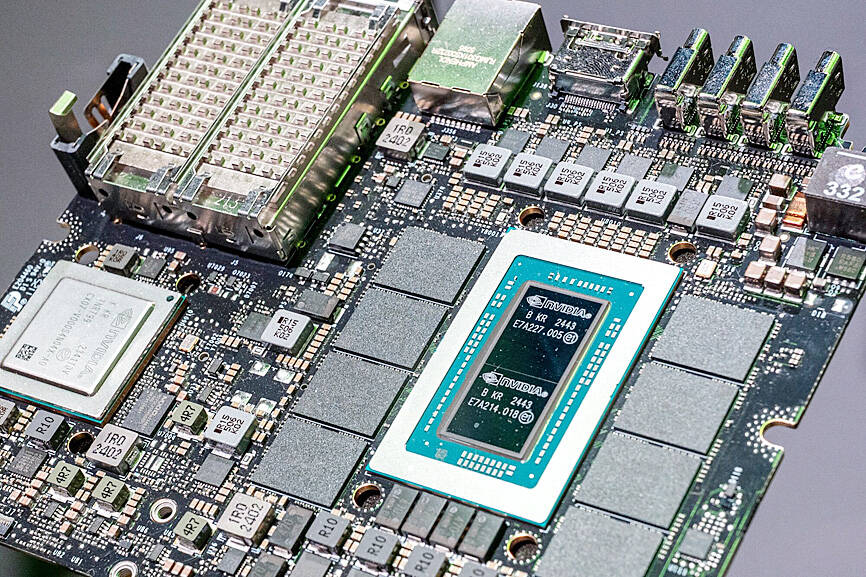Malaysia plans tighter controls over the flow of Nvidia Corp’s chips after the US demanded it keep a closer eye on advanced semiconductors that could potentially make their way to China, the Financial Times (FT) cited Malaysian Minister of Investment, Trade and Industry Tengku Zafrul Abdul Aziz as saying.
Washington asked Malaysia to closely scrutinize the shipment of Nvidia chips coming to the country, Tengku Zafrul told the newspaper. “They want us to make sure that servers end up in the data centers that they’re supposed to and not suddenly move to another ship.”
The minister’s pledge coincides with a Singapore investigation into the final destinations of a bunch of servers likely containing Nvidia chips, after they were allegedly shipped from the city-state to Malaysia.

Photo: Bloomberg
Investigators have charged three men with fraud for allegedly misleading server suppliers Dell Technologies Inc and Super Micro Computer Inc about the final end users of the hardware, which Singaporean authorities said might have contained Nvidia chips that are banned from sale in China.
Washington has for years curbed Chinese imports of advanced semiconductors and the tools used to make them, over concerns that the technology — particularly its artificial intelligence (AI) applications — could fuel Beijing’s military capabilities. They have also expanded some restrictions to countries from Southeast Asia to the Middle East, which US officials worry could serve as back doors for China to access banned tech.
Singapore has recently found itself a focal point of those efforts. Trump administration officials are looking into whether Chinese AI start-up DeepSeek (深度求索) managed to purchase banned Nvidia chips via third parties in Singapore, Bloomberg has reported.
US lawmakers have raised concerns about the large share of Nvidia revenue from Singapore despite relatively small physical shipments to the country, which they say points to possible transshipment of hardware to China.
Singapore and Nvidia officials have said that many Nvidia customers use the island as a centralized billing location, and that the island only receives a small number of physical Nvidia deliveries.

To many, Tatu City on the outskirts of Nairobi looks like a success. The first city entirely built by a private company to be operational in east Africa, with about 25,000 people living and working there, it accounts for about two-thirds of all foreign investment in Kenya. Its low-tax status has attracted more than 100 businesses including Heineken, coffee brand Dormans, and the biggest call-center and cold-chain transport firms in the region. However, to some local politicians, Tatu City has looked more like a target for extortion. A parade of governors have demanded land worth millions of dollars in exchange

An Indonesian animated movie is smashing regional box office records and could be set for wider success as it prepares to open beyond the Southeast Asian archipelago’s silver screens. Jumbo — a film based on the adventures of main character, Don, a large orphaned Indonesian boy facing bullying at school — last month became the highest-grossing Southeast Asian animated film, raking in more than US$8 million. Released at the end of March to coincide with the Eid holidays after the Islamic fasting month of Ramadan, the movie has hit 8 million ticket sales, the third-highest in Indonesian cinema history, Film

Taiwan Semiconductor Manufacturing Co’s (TSMC, 台積電) revenue jumped 48 percent last month, underscoring how electronics firms scrambled to acquire essential components before global tariffs took effect. The main chipmaker for Apple Inc and Nvidia Corp reported monthly sales of NT$349.6 billion (US$11.6 billion). That compares with the average analysts’ estimate for a 38 percent rise in second-quarter revenue. US President Donald Trump’s trade war is prompting economists to retool GDP forecasts worldwide, casting doubt over the outlook for everything from iPhone demand to computing and datacenter construction. However, TSMC — a barometer for global tech spending given its central role in the

Alchip Technologies Ltd (世芯), an application-specific integrated circuit (ASIC) designer specializing in server chips, expects revenue to decline this year due to sagging demand for 5-nanometer artificial intelligence (AI) chips from a North America-based major customer, a company executive said yesterday. That would be the first contraction in revenue for Alchip as it has been enjoying strong revenue growth over the past few years, benefiting from cloud-service providers’ moves to reduce dependence on Nvidia Corp’s expensive AI chips by building their own AI accelerator by outsourcing chip design. The 5-nanometer chip was supposed to be a new growth engine as the lifecycle